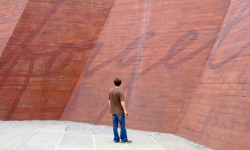
“Shall we receive the good at the hand of God, and not receive the bad?” asked Job (Job 2:10). Although he meant it rhetorically, it’s a question we often struggle with when ‘the bad’ seems cruel, tragic or pointless: “Why, God? It’s just not fair!” Craig Vernall explains how our demands for fairness may reveal a misplaced faith.
Our church recently took a funeral for a 33-year-old mother of three. She was diagnosed with cancer when her youngest child was born six months ago. When you’re faced with the tears and sobs of anguish that pour out of a grieving family during such a traumatic event, this just doesn’t seem fair. A young woman has died leaving behind a family that so needs a mum at this stage of their young lives. Everyone is affected deeply by real-life events like these.
Trying to reconcile this tragedy and others like it is a conundrum. We understand and experience the miracles that happen as God delivers us from circumstances when everything seems impossible. But it never quite works to our agenda, does it?
A faith built on sand
Pastoring brings us into close contact with people going through the worst seasons of their lives. During these times we try to reconcile God’s goodness with the tragedy that’s unfolding. Yet it’s during these times, if you listen carefully, you’ll hear someone’s world view being described. The most-often used phrase by many is, “This just isn’t fair,” which is a very revealing statement.
It appears that, for many believers, their Christian world view is built around fairness. We may proclaim our faith in Jesus but, when we scratch away to the foundation, many have their faith built upon fairness. Faith in fairness says that, “If you’re faithful in your devotional life and participate in church and serve where needed, then everything will go well for you.” Faith in fairness is a subtle but real transactional relationship with God that has us believing that our good and consistent behaviour warrants God’s personal favour.
However, the Christian world view tells us that fairness has nothing to do with Christian faith. Genesis 1-3 tells us emphatically that this world is broken. If it wasn’t broken then fairness would work. One of the results of sin entering our world is that life is not fair. Fairness cannot be relied upon. It’s not trustworthy and will ultimately disappoint us. Our faith must be in the crucified and resurrected Christ, through whom we can reconcile pain and loss and apply the salve of resurrection hope.
This oftentimes loud demand for fairness should serve as a warning for leaders of Christian communities. It signals that faith is being built upon sand, not upon the rock of Christ. But we shouldn’t be surprised by its presence either. We live in a largely transactional world: money for work; fitness for exercise; applause for excellence, and so it goes on.
But, when applied to our spiritual life, these transactions don’t make sense anymore. We’re left dazed, confused and suspicious. Suspicious of God because God doesn’t appear to work anymore: “I did this but God didn’t do that.” It is seemingly unfair.
Karl’s story
Four years ago our son-in-law Karl died of leukaemia. He was 25. Karl had been raised serving in a church. He was a worship leader and youth leader. He was a gentle soul; everyone loved Karl. After leaving school he began a vocation with a Christian broadcasting ministry. He spent time in India setting up a station in Hyderabad. He was never in trouble with the law. He loved his mum and dad and our daughter. But, a year after being diagnosed with leukaemia, he passed away. If any set of events were going to reveal an undisclosed faith in fairness it would be Karl’s story.
Why did Karl get taken home early? It is a valid question. None of us know why, and any attempt to explain this results in trite and meaningless statements. Karl’s death certainly wasn’t fair if our relationship with God is transactional. But our faith is not transactional or it wouldn’t be faith at all; it would be based on good works.
In Christ alone
Our faith must be built entirely upon the free gift of forgiveness and salvation that’s offered to us through Jesus’ death and resurrection, “so that no one may boast” (Ephesians 2:9). In fact, if we think we can add to our salvation by our own good works, or have to, then this is fundamentally evil. Evil because these good works are saying that the completed work of the cross is not complete at all. It appears to require my good works to close the deal.
Fairness is not part of the Christian life but mystery certainly is. In this mystery we’re reminded that we’re not truly part of this world but “desire a better country, that is, a heavenly one” (Hebrews 11:16). So, we hold on to the suffering and resurrected Jesus to see us through when life doesn’t seem fair. We hold on without attributing him blame for our fallen world. But we remain grateful that Jesus has provided a way through for us as he identifies with our suffering.
Fairness masquerades as faith. Fairness is a subtle and yet powerful deceit that ultimately disappoints. We should have our ears and eyes peeled for when faith in fairness appears within our churches. In a broken world fairness doesn’t work, but Jesus does.
Story: Craig Vernall
Craig is the National Leader of the Baptist Churches of New Zealand and the Senior Pastor of Bethlehem Baptist Church.
Scripture: Unless otherwise specified, Scripture quotations are from New Revised Standard Version Bible, copyright © 1989 National Council of the Churches of Christ in the United States of America. Used by permission. All rights reserved.


